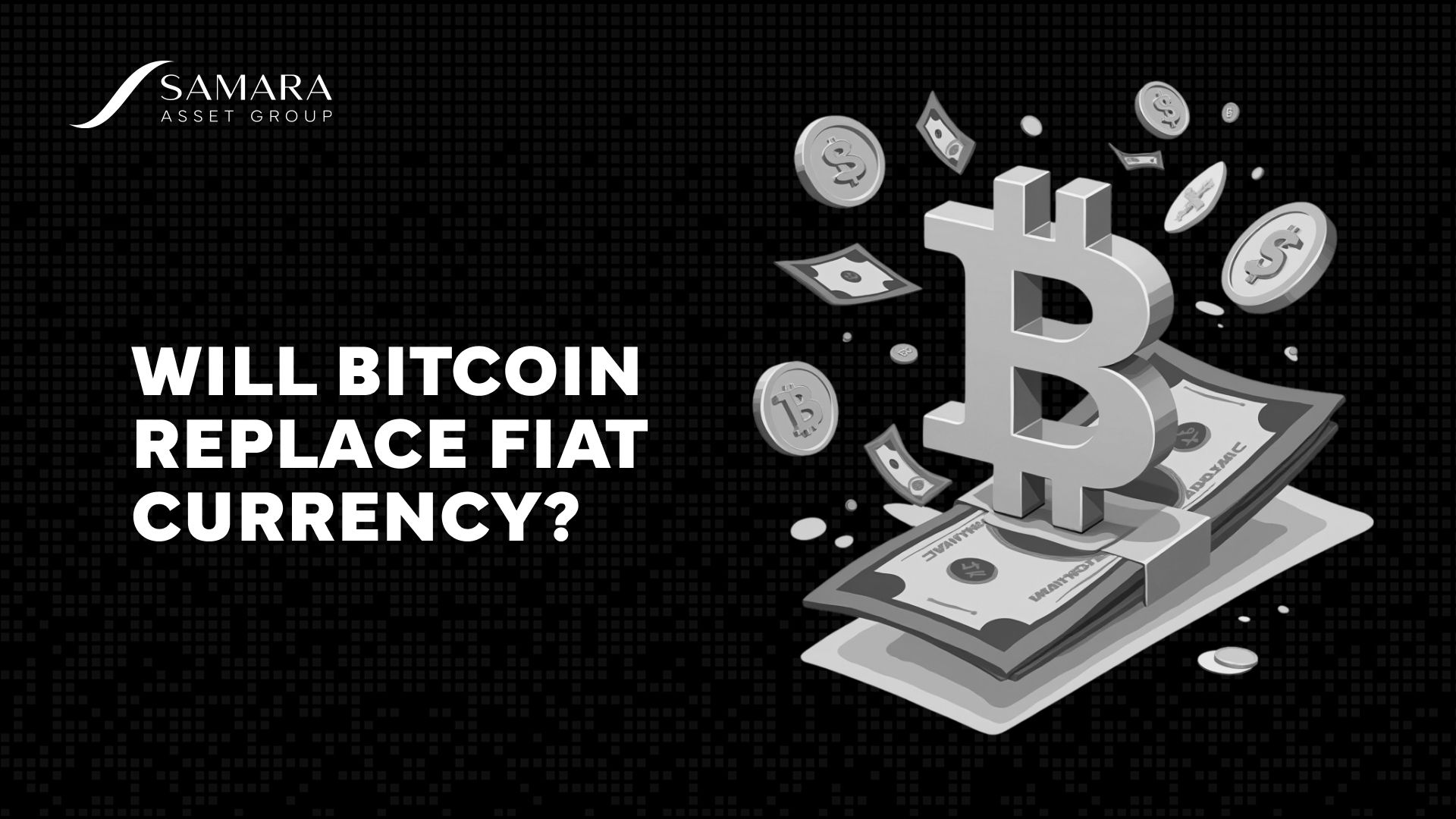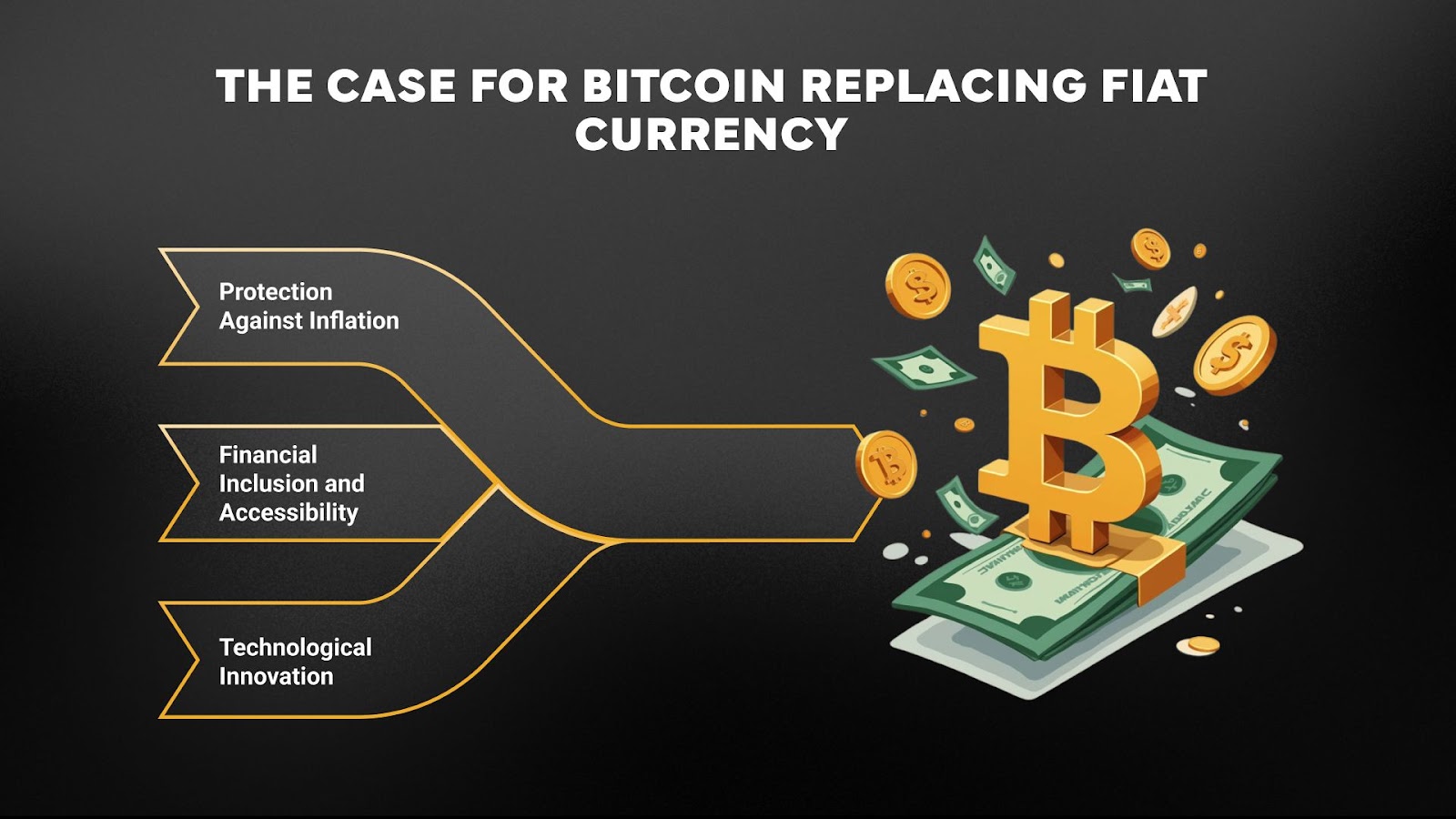
Will Bitcoin Replace Fiat Currency? The Case For and Against
June 25, 2025





As the whole planet is watching international trade wars and trying to figure out the next global reserve currency in the multipolar world, Bitcoin emerges as a possible contender in this global race for monetary power.
Which raises the question: can Bitcoin, as a neutral monetary technology, replace fiat currencies?
This article looks at the pros and cons of both systems and explores what role Bitcoin as cryptocurrency might play in the future of money and, in particular, whether it can make fiat currency obsolete.
The Current State of Money
While the global financial system today includes a broad range of assets, such as stocks, bonds, and commodities, it still fundamentally depends on fiat money to function.
Nowadays, fiat currencies aren't backed by any asset of intrinsic value (since they are no longer backed by gold). Nevertheless, fiat money is an older system than Bitcoin that underpins almost all national economies, which rely on the strength of the money they use.
However, fiat currencies face a few persistent challenges. The most notable of these is inflation, which leads to a decline in purchasing power and, as a result, higher prices of goods and services.
In addition, central banks, which are mostly in charge of local fiat money systems, aren't always immune to political and other forms of influence.
Moreover, the fiat system isn’t immune to collapse. In some countries, national currencies have rapidly lost value, leading to public distrust, bankruptcies, and rising poverty.
As a result of many of the shortcomings of fiat money, Bitcoin has grown in popularity since its inception. Since its launch in 2009, it has evolved from a niche experiment in digital money into a widely recognized investment asset and global currency.
But can this trend lead to Bitcoin replacing fiat currency in the future?
Fiat Currency: Strengths and Weaknesses
Fiat currencies are still the backbone of the global financial system.
They are issued and regulated by central banks, and accepted for everything from daily purchases to international trade. By being backed by the state, they are viewed as reliable.
Meanwhile, to manage the economy, central banks oscillate between changing interest rates and the money supply. Too much supply of the currency leads to inflation, which is one of fiat money’s biggest challenges. Nevertheless, the central banks increase the supply of money to stimulate the economy. When it is extreme, however, inflation might get out of hand, as the recent spike in global prices has shown.
Besides inflation, fiat money is challenged by being a system whose control is centralized. The central banks control monetary policy, and those decisions can be influenced by political and narrow business agendas, which makes the system less trustworthy.
Bitcoin’s Value Proposition
Bitcoin is in many ways the antidote to fiat money.
In particular, its supply is limited by its protocol, which caps it at 21 million BTC. Therefore, additional units of Bitcoin can't just be created out of thin air.
Its other main strength is decentralization.
Unlike fiat currencies, Bitcoin isn't controlled by any government or central bank. This network is maintained by thousands of independent miners and node runners around the world through decentralized consensus. This makes it highly resistant to arbitrary interference.
Also worth mentioning is that Bitcoin is fully digital and global.
It has no physical form and doesn’t require a bank to store or transfer it. Users can send or receive funds from anywhere with just a Bitcoin wallet and internet access, while solutions for BTC transfers without internet also exist. This is especially useful in regions with limited access to financial services.
The Case For Bitcoin Replacing Fiat Currency

Bitcoin has several features that make it a strong alternative to traditional money. Its design offers potential solutions to problems faced by fiat currencies, from inflation to limited access and outdated systems.
Protection Against Inflation
One of the main reasons Bitcoin is seen as a better alternative to fiat currencies is its potential to protect you from inflation (as we highlight with our Bitcoin CPI). As such, Bitcoin is often called “digital gold” that can store value similarly or even better than gold, while at the same time being highly liquid, easily transportable, self-custodied, and divisible.
When inflation starts to eat into the purchasing power of fiat currencies, your income loses value rapidly, and savings become worthless, as has been the case in Venezuela and Argentina.
Bitcoin is increasingly becoming a safe haven asset of choice.
Financial Inclusion and Accessibility
According to statistics from the World Bank, over a billion people around the world don't have access to basic banking services. The numbers are higher in developing countries, where opening an account or getting a bank card can be difficult due to a lack of the necessary infrastructure, missing documents, or low trust in financial institutions.
Bitcoin offers an alternative solution that does not require a bank account, just a smartphone with internet access.
With BTC, transfers can be made directly, much faster, and often with lower costs, especially when the Lightning Network is used.
Technological Innovation
One of Bitcoin’s key technological advantages is its use of blockchain, which is one of the implementations of distributed ledger technology.
Bitcoin’s blockchain, which acts as a constantly updated database, is considered to be the most decentralized and secure cryptoasset network. Bitcoin miners and node runners guarantee that this censorship-resistant database is secure and free from abuse.
You can use Bitcoin without any intermediaries, such as a bank, or without completing additional verification steps, simply by directly transacting with your friends or businesses.
The Case Against Bitcoin Replacing Fiat
Despite its strengths, Bitcoin also faces challenges that need to be overcome for it to replace fiat money. These range from technical to regulatory.
Practical Adoption Hurdles
The Bitcoin network has come a long way in a decade, improving its infrastructure, and major updates have been implemented to the core protocol, including the launch of the Lightning Network in 2018.
This has given it the capacity to deliver high throughput. However, as the demand for Bitcoin grows, developers are working on additional solutions that would help Bitcoin scale further.
The other hurdle that has to be overcome is making the Bitcoin user experience friendlier. People need to easily find their way around while using wallets and self-custodying BTC. They also need to understand security risks. In either case, more user-friendly interfaces are coming into the market and they are going to bring major change.
Economic Policy Constraints
Bitcoin doesn’t allow governments to manage the economy the way they used to with fiat currencies.
Central banks can't control Bitcoin supply, adjust interest rates, or launch stimulus programs by printing more money — all of which are the traditional tools for managing the economy. This makes Bitcoin difficult to use within usual economic policy frameworks.
Regulatory Landscape
While the situation is improving, the legal status of Bitcoin remains unclear in some parts of the world. In some places it’s banned, in others it’s allowed, or operates in a gray area. This makes taxation complicated, slows down institutional adoption, and raises questions about compliance.
Still, there's progress, as more countries clarify regulations and overturn bans, while even some central banks are considering buying BTC.
Will Bitcoin Replace Fiat Currency in the Future?
While opinions vary, Bitcoin fully replacing fiat currencies is still seen as an unlikely event even in the long term. The current system and governments are considered too strong to give up their positions lightly.
However, as Bitcoin recognition and adoption grow, developers and businesses improve Bitcoin infrastructure, make it more scalable and user-friendly, Bitcoin is likely to evolve into an even more serious alternative to the current system.
Instead of replacing fiat, Bitcoin may become a complementary system used for specific purposes like cross-border payments, storing value, or improving financial access and security, especially in regions with unstable fiat systems.
In either case, the most likely outcome is that Bitcoin and fiat currencies co-exist for many years to come.
FAQs
Is Bitcoin stable enough to replace fiat currency?
At the moment, Bitcoin’s price volatility is too high for BTC to replace fiat currency for daily purchases on a larger scale. However, volatility keeps decreasing, while many fiat currencies have lost more value than Bitcoin during BTC’s sharpest downturns, meaning that Bitcoin's ability to replace fiat might also depend on a specific region. Moreover, for many Bitcoiners, BTC has already partially or even fully replaced fiat currency.
Could Bitcoin and fiat currencies co-exist in the future?
Yes, they could, and that is the most probable outcome. Bitcoin offers an alternative vision of financial systems, focused on decentralization, faster peer-to-peer transactions, and easier access, especially for those without traditional banking. Meanwhile, fiat currencies could remain as a state-controlled money form.

